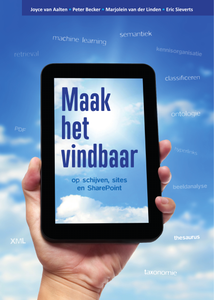De informatieprofessional 3.0 moet niet bestaande dingen beter doen, hij moet betere dingen doen. Een van de essentiele vaardigheden is inhoudelijke verdieping: sleutelen aan kaders in plaats van binnen kaders te werken.
DOCUMENT

In april '07 vond in de VS het congres 'Computers in Libraries' plaats. Gerard Bierens en Liesbeth Mantel signaleren de opvallendste trends. 'De bibliotheekcatalogus gaat onherroepelijk onder het mes.'
DOCUMENT

In de informatiesector werken veel zzp’ers. Velen hebben daar zelf voor gekozen. Een grote groep uit nood: een vaste baan werd verloren en de hypotheek moet worden betaald. Dat leidt tot onwenselijke situaties.
DOCUMENT

Het beheer van grote hoeveelheden documenten vormt een steeds grotere uitdaging voor organisaties. Of het nu gaat om bestaande of nieuwe informatiesystemen, lokaal of in de cloud, informatiemanagers stellen zich de vraag welke mogelijkheden er zijn om de toegankelijkheid en vindbaarheid van de informatie zo effectief mogelijk te realiseren. Een goede vindbaarheid bespaart immers vele uren arbeidstijd en voorkomt incomplete dossiers. Traditionele instrumenten als taxonomieën, thesauri en autorisatielijsten bewijzen daarbij nog dagelijks hun waarde en de technische ontwikkelingen hebben de mogelijkheden uiteraard verruimd: automatische indexering en klassering, ontologieën en hyperlinking zijn waardevolle aanvullingen. In dit boek behandelen we belangrijke methoden en technieken om informatie (documenten) van een organisatie vindbaar te maken. De theorie van de toegankelijkheidsleer wordt vanaf de basis behandeld en aan de hand van vele voorbeelden komen technieken en instrumenten als taxonomie, thesaurus, ontologie, zoekmachine en classificatie aan de orde, inclusief stappenplannen om hier zelf mee aan de slag te gaan. Omdat SharePoint een veelgebruikt platform is voor het beheren en delen van documenten, besteden we een apart hoofdstuk aan de wijze waarop documenten binnen SharePoint zo goed mogelijk vindbaar kunnen worden gemaakt. De hoofdstukken worden afgewisseld met kaderteksten waarin specifiek wordt ingegaan op gerelateerde onderwerpen als XML, machine learning en cardsorting. Iedereen die in de praktijk betrokken is bij de implementatie van een informatiesysteem of in opleiding is tot informatieprofessional kan putten uit de uitgebreide beschrijvingen en handvatten die dit werk biedt. Omdat studenten een deel van de doelgroep vormen, is dit werk als open textbook onder een Creative Commons licentie gratis te downloaden. Originele document: https://udocstore.nl/docs/9789492388001 Joyce van Aalten (docent bij GO Opleidingen) Peter Becker (docent informatiebeheer aan de Haagse Hogeschool en GO Opleidingen) Marjolein van der Linden (docente aan de Hogeschool van Amsterdam, opleiding Media Informatie en Communicatie en bij de opleiding Communicatie) Eric Sieverts (docent bij VOGIN en GO Opleidingen)
DOCUMENT

Op verzoek van het Stichting GO Fonds is onderzoek gedaan naar de vraag welke nationale en internationale innovatieve projecten de afgelopen vijf jaren in het Nederlandse en Vlaamse veld van bibliotheken, archieven en informatiedienstverlening hebben plaats gevonden. Het fonds vindt namelijk dat er weinig geschikte verzoeken binnenkomen voor ondersteuning van vernieuwingsprojecten in de branche. Met het antwoord op deze vraag kan het fonds zich beter richten op de sectoren en organisaties die voor ondersteuning in aanmerking komen.
DOCUMENT

Are the so-called “new” business models focused on “sharing” actually promoting new behaviour or are they simply using old behaviour of the provider/consumer in a new technological environment? Are the new tech companies in the sharing economy with their “new” business models grabbing too much power, unnoticeably?
DOCUMENT

De scoringsrubriek is een checklist met aandachtspunten voor het beoordelen van informatievaardigheden van studenten. Behalve de beoordelingscriteria wordt ook het typerende studentengedrag op twee niveaus geoperationaliseerd. De scoringsrubriek is te gebruiken in het kader van de beoordeling van diverse studentenproducten zoals onderzoeksverslagen, eindscripties en essays. Toegevoegd is een korte toelichting op het gebruik van de scoringsrubriek en een verslag van ervaringen ermee bij Saxion en de Nederlandse Defensie Academie.
DOCUMENT

Open access publicatiekanalen kunnen een aantrekkelijk medium zijn voor studenten, menen IDM-docenten Peter Becker en Jos van Helvoort. Maar dan moeten nog wel onduidelijkheden over het auteursrecht uit de weg worden geruimd. Ook zou meer interactiviteit de aantrekkelijkheid ervan vergroten. Open-access publishing channels can be an attractive medium for students in higher education. But a lack of clarity on copyright issues must be adressed first. Also, more interactivity would enhance the attractiveness. [Peter Becker en Jos van Helvoort]
DOCUMENT

Meta-analyse van peer reviewed publicaties op het gebied van informatiewetenschappen die in 2010 door onderzoekers uit Nederland zijn gepubliceerd.
DOCUMENT

Nederland zet koers richting een open vorm van wetenschapsbeoefening, getuige onder andere de lancering van het Nationaal Plan Open Science (NPOS) afgelopen februari en het nieuwe regeerakkoord dat stelt dat open access en open science de norm worden in wetenschappelijk onderzoek. Open science heeft als doel om wetenschappelijke kennis op transparante wijze en voor een breed publiek te publiceren. Dat vergt een herijking van onderzoek doen, samenwerking tussen onderzoekers en de wijze waarop kennis wordt gedeeld en de wetenschap wordt georganiseerd. Informatieprofessionals kunnen hierbij een rol van betekenis spelen, zoals blijkt uit cases van de Universiteit Utrecht, Hogeschool van Arnhem en Nijmegen en KNMI. Maar eerst een korte toelichting op open science en het NPOS. http://www.informatieprofessional.nl
DOCUMENT
